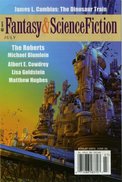
| Editor: | Gordon van Gelder |
| Issue: | Volume 115, No. 1 |
| ISSN: | 1095-8258 |
| Pages: | 162 |
Nothing particularly outstanding in the non-fiction this issue, although I'm becoming more interested in Swanwick's The Dragons of Babel the more I read about it, and Kathi Maio is enjoyable as always.
"Fullbrim's Finding" by Matthew Hughes: I think Henghis Hapthorn is the best of Hughes's decadent future stories, and while I'm not enough of a fan to buy and read the novels, I was happy to see him return for another short story. The upcoming change in the nature of the world is put on the back burner, and instead we get a typical sort of investigation leading up to a surprising discovery about the world. A Douglas Adams concept written in Hughes's dryly ironic style is surprisingly effective and ties rather well into Hapthorn's self-interested cynicism. Like all of Hughes's work, it's a bit slow, but it's a solid entry in the series. (6)
"Reader's Guide" by Lisa Goldstein: I loved this story at the start, when it's a reader's guide showing a surprising awareness of its own banality and throwing in the sorts of questions that you always wish such a guide would ask. While Goldstein maintains that tone, it reminds me favorably of some of the old-time Internet jokes, such as the famous fake final exam. But then it turns into a sort of fantasy story about the Lord of Story and about a muse of sorts, some of which is vaguely interesting but not new and nowhere near as funny. The start is great stuff, but I don't think I really needed the ending or the explanation of what was going on. (7)
"The Roberts" by Michael Blumlein: This long novella is the heart of the issue. It tells the story (via an extended fictional biography at the start) of a world-famous architect and his loves, about his passion for his work that chokes other people out of his life, and about his reptition of the same pattern of romantic problems through success and failure. Blumlein does okay with this introduction, but it feels occasionally like an infodump and the SFnal elements aren't horribly compelling. The story doesn't take off until he turns his attention to creating a lover with whom he won't follow the same pattern.
Grace is a fascinating character and the heart of the story. She's made to love Robert, and hence has to function (and be written) within some fairly tight limitations, but still manages to develop not only into her own character but to take a constructed personality and transform it into a credible person just slightly askew from a typical human. It's fascinating and well-done. The rest of the plot didn't work for me as much, and I found the ending vaguely inconclusive and unsatisfying, but Grace is an interesting idea well-executed and worth reading the story for. (6)
"Enfant Terrible" by Scott Dalrymple: This is a brief and creepy story about dangerous children who aren't actually children. Neither the pacing nor the characters clicked for me, but I did like the step towards parody of adults who seem to lose all intelligence when around children. I wish Dalrymple had developed the idea more completely, though, rather than going for the easy thriller setup. (5)
"Poison Victory" by Albert E. Cowdrey: Cowdrey writes excellent character-driven stories on the edge of horror. This one doesn't have many fantastic elements, but for horror, Nazis are an adequate substitute. "Poison Victory" is an alternate history in which Germany defeated Russia and the Third Reich continues on in 1949. It's told from the perspective of a Nazi war hero who was awarded control of a portion of Russia and dives into the point of historical diversion via flashback as the viewpoint character tries to maneuver German politics and hide his opposition to Hitler. The plot doesn't exactly crackle, but Cowdrey's characterization is excellent and the alternate history is chillingly credible. I'm not much of a fan of Nazi stories, but this is a good one and much less stereotyped than most. (7)
"The Dinosaur Train" by James L. Cambias: It's a story about a travelling circus in an alternate world in which dinosaurs were discovered. It features generational conflict, caring for dinosaurs, and circus acts. If that sounds great to you, you'll probably like it; if you're now asking "and... what else?", you can safely skip it. A neat idea, but a slight story with an entirely stock conflict and resolution. (5)
Reviewed: 2008-07-24